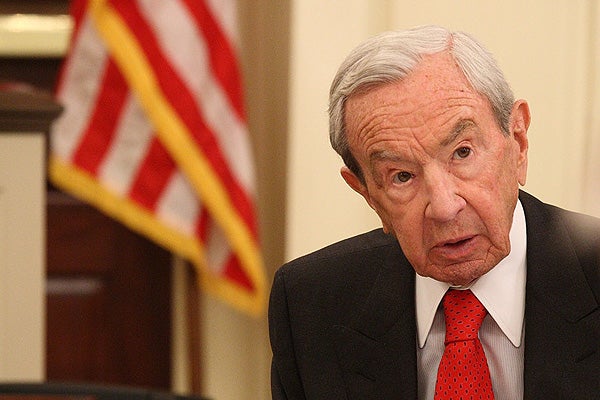Former U.S. Secretary of State Warren “Chris” Christopher, an alumnus of Stanford Law School who served on the university’s Board of Trustees from 1972-1992, including three years as chair of the board, has died. He was 85.

Warren Christopher was a skillful negotiator and accomplished lawyer whose career spanned five decades (Image credit: Tom Cogill)
Christopher died March 18 at his home in Los Angeles of complications from bladder and kidney cancer, said Sonja Steptoe of the law firm O’Melveny & Myers, where Christopher was a senior partner.
“Warren Christopher combined a boundless intellect with an elegant personal style,” said Donald Kennedy, president emeritus of Stanford. “Chris chaired the board for three of my years as president – 1985-1988 – and gave me the wisest and most thoughtful advice I could have wished for.
Kennedy said Christopher often quoted from fictional character Sergeant Preston’s law of the Yukon – “The scenery changes only for the lead dog.”
“He gave me a little ornament featuring that law,” Kennedy said. “It reminds me of Chris and what he did for his country at the end of President Carter’s term.”
As deputy secretary of state under President Jimmy Carter, Christopher’s negotiations played a key role in the release of American hostages in Iran. Carter awarded him the Medal of Freedom, the nation’s highest civilian award, in 1981.
Christopher, appointed the nation’s 63rd secretary of state in 1993 by President Bill Clinton, was considered the consummate lawyer-statesman – multifaceted and unstinting in his service to the nation and the larger, global community.
“He was a friend, a mentor and truly a diplomat’s diplomat,” U.S. Secretary of State Hillary Clinton said in a statement. “He served our country with such great distinction in so many capacities over his long and very productive life. There are a lot of days in this job when I ask myself, ‘What would Warren do?’ From the Balkans to the Middle East, to China and Vietnam, he helped guide the United States through difficult challenges with tremendous grace and wisdom.”

Warren Christopher, ’49 (sitting), the Stanford Law Review‘s first president, discusses plans with Shirley Mount Hufstedler, ’49, article and book review editor; Arthur Miller, ’49, case editor; and Malcolm Dungan, ’49 (BA ’47), note editor. (Image credit: Courtesy Stanford Law School archives)
A skilled negotiator and accomplished lawyer whose career spanned five decades, Christopher deftly moved between public and private practice, serving three American presidents and a multitude of commissions and advisory boards, while also assuming senior leadership roles at O’Melveny & Myers.
As secretary of state under President Clinton, Christopher helped bring peace to Bosnia and to parts of the Middle East.
In 2008, O’Melveny & Myers – where Christopher served as chairman of the firm from 1982 to 1992 and as a senior partner until 2011 – honored him by endowing the Warren Christopher Professorship of the Practice of International Law and Diplomacy, a joint appointment between Stanford Law School and the Freeman-Spogli Institute for International Studies.
“Warren Christopher was a unique and very special person,” said Larry Kramer, dean of Stanford Law School. “He was brilliant and thoughtful, generous, modest, and unselfish to the core. In everything he said and did, he embodied what we mean when we talk of someone as classy.”
Born in Scranton, N.D., on Oct. 27, 1925, Christopher came to Stanford Law School directly from active duty with the Naval Reserve, where he served as an ensign in the Pacific Theater from 1943 to 1949.
At law school he was selected president of the first volume of the Stanford Law Review and graduated Order of the Coif, the national law honor society.
After receiving his law degree, Christopher clerked for Justice William O. Douglas of the U.S. Supreme Court. He then joined O’Melveny & Myers in October 1950, beginning a lifelong partnership with the law firm that embraced his periodic leaves for service in government.
Christopher’s first political appointment came in June 1967 when President Lyndon Johnson tapped him for the job of deputy attorney general, a position he held until 1969. He again answered the call to government in 1977 when President Carter asked him to serve as deputy secretary of state, a position he held until 1981. In 1993, President Clinton appointed Christopher as secretary of state, a position he held until 1997.
In 1991 Christopher was appointed chairman of the Independent Commission on the Los Angeles Police Department that investigated the Rodney King assault and subsequent riots in Los Angeles. In 1992, he headed the vice presidential search for then-Gov. Clinton during his presidential campaign and served as director of the presidential transition.
Most recently, he co-chaired – along with former U.S. Secretary of State James A. Baker III – the National War Powers Commission of the Miller Center of Public Affairs at the University of Virginia.
Christopher’s many professional activities included service as president of the Los Angeles County Bar Association, 1974-75; chairman of the Standing Committee on the Federal Judiciary of the American Bar Association, 1975-76; member of the Board of Governors of the State Bar of California, 1975-76; and special counsel to California Governor Edmund G. Brown in 1959.
Christopher served as chairman of the Carnegie Corporation of New York’s Board of Trustees; director and vice chairman of the Council on Foreign Relations; director, Los Angeles World Affairs Council; vice chairman of the Governor’s Commission on the Los Angeles riots in 1965- 66; special consultant to Under Secretary George W. Ball on Foreign Economic Problems; president of the Coordinating Council for Higher Education in the State of California; and Fellow of the American Academy of Arts and Sciences.
Christopher is survived by his wife, four children and five grandchildren.